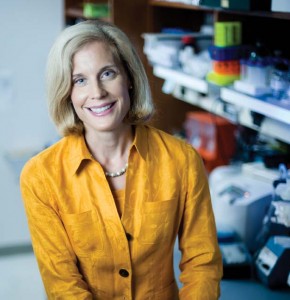Reducing Health Disparities
November 22, 2017 | Jennifer Pietenpol

Photo by Joe Howell
A Vanderbilt-Ingram Cancer Center (VICC) researcher is leading the nation’s largest-ever study of breast cancer genetics in African-American women—a $12 million initiative funded by the National Cancer Institute to determine the factors that make breast cancer deadlier for black women.
Our cover story about the Breast Cancer Genetic Study in African-Ancestry Populations, for which Dr. Wei Zheng is the lead principal investigator, and other content in this issue of Momentum address health disparities. VICC has a long history of investigating health disparities. This latest initiative builds upon that research, notably the Southern Community Cohort Study, a partnership between VICC and Meharry Medical College that was launched through the vision and leadership of Dr. Bill Blot working collaboratively with Dr. Margaret Hargreaves at Meharry.
Also, in this issue we introduce Dr. Tuya Pal, our associate director of Cancer Health Disparities. She’s an expert on inherited cancers and is focused on ensuring that genetic tests for cancer risks become more available across all population groups.
Dr. Pal is not the only new face at VICC. We also highlight four physicians we have recently recruited who share what motivates them at an exciting time in cancer treatment as new immunotherapies improve outcomes and expand possibilities.
One major health disparity in the region that we serve is the high rate of smokers. Read in this issue how we’re helping our patients quit smoking before cancer occurs and are screening patients at high-risk for lung cancer to detect it at early stages. We’re also working to prevent other health disparities. For instance, HPV vaccination rates for teenagers in Tennessee are much lower than the nationwide average. We staged a number of initiatives throughout 2017 to encourage vaccinations.
Reducing health disparities is an important part of the Vanderbilt-Ingram mission and has been from the start with important initiatives launched by Dr. Hal Moses. He has retired after more than a half century of work on cancer research and treatment. A profile about Dr. Moses in this issue details his leadership as the first director of VICC and his longstanding commitment to understanding and addressing health disparities and increasing diversity in biomedical research and training. Even in his retirement, Hal will continue to share his time and effort to advance important partnerships and programs that focus on health disparities and increasing diversity in biomedical research—his actions are inspiring to all of us at Vanderbilt and in the community.
